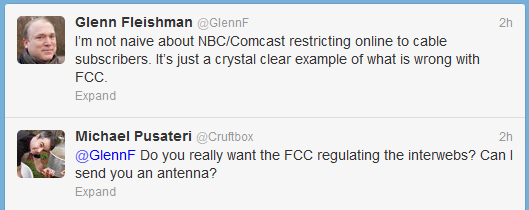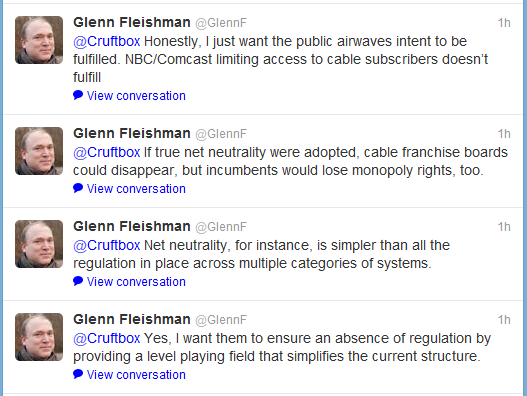I was out on my bike ride today and stopped for a coffee. I checked the Twitters, as you do, and saw a tweet by my friend Glenn. I made a quick reply.
To which Glenn shot back:
That’s too much to reply back to on my phone via Twitter, so now that I’m home, so I can be clear and a little more verbose about why we don’t want the FCC getting into the business of content on the internet. They’ve done a poor job on broadcast TV, so giving such a politicized group even more control is a bad idea.
Let’s be clear on the differences between over the air, broadcast television and internet video.
In the United States, the public owns the electromagnetic spectrum. We’ve decided to license that spectrum for various uses, including to private companies for television broadcasting. Part of the deal is that these licensors provide their service for free to people in their area and act “in the public good”. It’s a little more complicated than that, but basically we get over the air television (OTA) for free because the airwaves belong to us. We have the right to record this television, store it, and watch it wherever we want on any device we want. The media companies don’t want this to be so, but the courts have ruled this way consistently.
The internet is a different story. The internet is mainly a collection of private networks that are joined together with peering agreement to enable the global connectivity we all enjoy. In the US, the FCC partially regulates internet access companies, because in many cases the companies enjoy monopoly or duopoly status due to their heritage as cable television and telephone companies and their agreements with local governments (the cable franchise boards Glenn mentions) that allow tearing up streets, easements, and string lines overhead. But the internet does not belong to the public. The public doesn’t own the Olympics either.
To force the television broadcasters to stream their content over the internet for free is wrong because we don’t own the internet or the content being shown, all we own is the radio spectrum. The intent of the ‘public airwaves’ is that we get what the airwaves are used for free. Expecting otherwise with like saying “I get free water from the fountain at the public park, so I should get free soda at McDonald’s.” They are two completely different situations and the public’s rights are considerably different.
The FCC net neutrality discussion should be focused on access, not content control.
What combined broadband/media distribution companies would love to put in place is pricing based on KINDS of internet sites you visit. Nothing would make them happier than to be allowed to charge a premium to visit Netflix and Hulu. The ramifications of this would terribly restrict competition, innovation, and freedom of speech. THIS is what net neutrality should aim to prevent.
I don’t have a problem with broadband providers charging more for excessive usage or higher speeds. Sure it sucks, but it’s my choice of what speed/amount of access I want. Just don’t restrict my access to anywhere on the internet I want to go. Just like I have a choice of what car I want to buy at widely varied prices and buy whatever gasoline I want, I expect to drive my car on any road I want.
To ask the FCC to start meddling in how media companies deal with the internet and forcing them to do things because of over the air television paradigms is misguided. Enshrining government intervention into the rapidly evolving digital media marketplace is a sure way to stifle innovation and avoid competition.
Already you see things like Aereo popping up to disrupt the control that OTA broadcasters have on television online. Let’s let innovation solve these problems, not politicians.
Yes, it sucks that much of the digital Olympics coverage is behind a paywall. But we all have many options from using an antenna to having a UK based VPN to paying for cable/satellite to relying on pirate retransmissions. If NBC makes bad choices in how they serve the public online, they will pay for it in the long run as the marketplace walks away from them.
NBC paid for the rights to broadcast the Olympics. Anyone with the cash could have outbid them, with or without a OTA outlet. Compare it to DirecTV, who pays a huge amount for exclusive rights to the NFL games, preventing digital distribution by NBC, CBS, and FOX (the OTA broadcasters). Should the FCC force DirecTV to allow NFL games to be streamed for free as well, just because they air on local stations? How far down this rabbit hole do you want to go?
Again, I’m not trying to defend NBC, just to point out that the answer to this kind of problem is not to legislate it away. Just like any trouble on the internet, the answer is to route around the damage.
Patience. Patience my friends, solve your own problems, and you will get what you want in the end.
“The future is here, it’s just not evenly distributed.” – William Gibson

